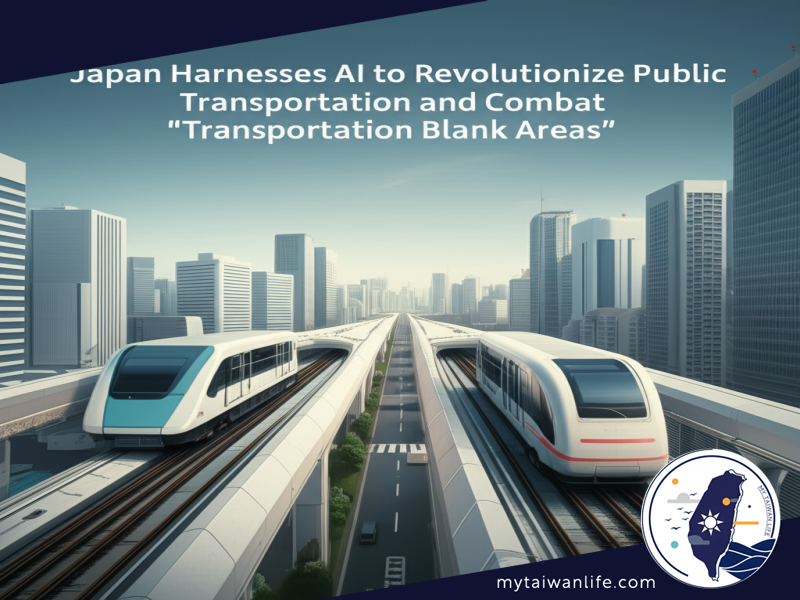Japan Harnesses AI to Revolutionize Public Transportation and Combat "Transportation Blank Areas"
Cutting-edge technology aims to connect the elderly to healthcare and streamline travel for tourists, enhancing accessibility across the nation.

TOKYO – The Land, Infrastructure, Transport and Tourism Ministry in Japan is embarking on a groundbreaking initiative to leverage digital technology and Artificial Intelligence (AI) to address the challenge of "transportation blank areas," where access to public transportation is limited.
The ambitious plan aims to improve convenience for all citizens, particularly focusing on the needs of the elderly and tourists. The Ministry intends to utilize AI to optimize the arrangement of reservation-based buses for elderly residents attending hospital appointments and to ensure the availability of taxis for tourists visiting popular destinations. The goal is to have this innovative system fully operational nationwide by approximately 2030.
Concrete plans were announced last month, with approximately 20 experiments scheduled for this fiscal year. One key experiment will take place in Tokushima, focusing on enhancing the efficiency of reservation-based buses that transport patients from hospitals to their homes. Fujitsu Ltd. will spearhead the development of a system that predicts the time patients will spend receiving medical care and completing billing procedures.
The reservation system of Tokushima Prefectural Central Hospital will be integrated with the bus dispatch system operated by a local taxi association. This integration will enable the system to dispatch buses to transport patients home just prior to their scheduled departure, thereby minimizing waiting times.
In Hokkaido, Asahikawa Airport is developing a system to facilitate seamless travel from the airport to tourist attractions. Airlines will share crucial information on the number of arriving passengers and any flight delays with local bus and taxi companies, enabling the companies to adjust arrival and departure times. Jorudan Co., a prominent transfer information search software company in Tokyo, will develop the system. The goal is to ensure an adequate number of taxis are available at the airport to meet the needs of arriving passengers.
Japan has seen a reduction in rail and bus services in recent years, influenced by a decline in passenger numbers. This has especially affected depopulated areas, where the elderly may struggle to access healthcare due to transportation limitations. Moreover, some tourist destinations are struggling to cope with the increasing demand for public transport driven by the influx of both domestic and international visitors.
While ridesharing services are expanding as one potential solution, the shortage of drivers remains a challenge. Last year, the Ministry established a public-private partnership to address the transportation shortage and seek new solutions. The Ministry intends to use AI and other private-sector technologies to improve efficiency and address the labor shortage.
Other Versions
Japón aprovecha la IA para revolucionar el transporte público y combatir las "zonas vacías de transporte"
Le Japon exploite l'IA pour révolutionner les transports publics et lutter contre les "zones vierges de transport" ;
Jepang Memanfaatkan AI untuk Merevolusi Transportasi Publik dan Memerangi "Area Kosong Transportasi";
Il Giappone sfrutta l'intelligenza artificiale per rivoluzionare il trasporto pubblico e combattere le "aree vuote dei trasporti"
日本はAIを活用して公共交通に革命をもたらし、交通空白地帯と戦う;
일본, AI를 활용하여 대중교통을 혁신하고 '교통 사각지대'를 해소합니다;
Ginagamit ng Japan ang AI upang Baguhin ang Pampublikong Transportasyon at Labanan ang "Mga Walang Saklaw na Lugar sa Transportasyon"
Япония использует искусственный интеллект для революции в общественном транспорте и борьбы с "транспортными пустотами"
ญี่ปุ่นใช้ AI ปฏิวัติระบบขนส่งสาธารณะและแก้ไขปัญหา "พื้นที่ขนส่งว่างเปล่า"
Nhật Bản Ứng Dụng AI để Cách Mạng Hóa Giao Thông Công Cộng và Chống Lại "Vùng Trắng Giao Thông"

